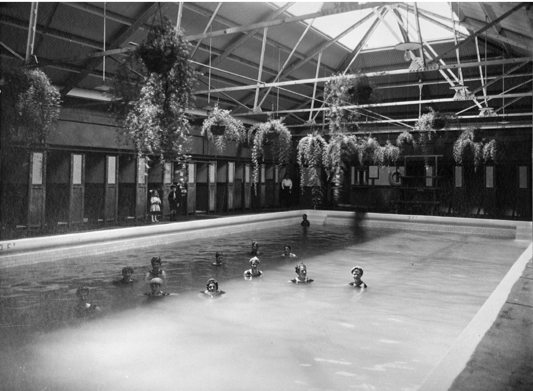Auckland (43 hours) – 16 to 18 January 1931
Tepid Baths Auckland
The swim in Auckland had been arranged on an earlier visit to that city, and the Town Clerk had offered Mercedes the use of the Tepid Baths. Arrangements were put in hand for observers and timekeepers to be in place, and 40 dashboard posters were ordered to advertise the event on Auckland’s tramcars over a period of nine days, at a cost to her of £9.0s.0d.

Photograph (Ref 7-A565) from the
Sir George Grey Special Collections, Auckland Libraries.
Image published courtesy of Auckland Libraries
On Friday 16 January Mercedes entered the water at 5.35 a.m. after Councillor A.S. Patterson, Chairman of the Baths Committee, had wished her good luck on behalf of the citizens of Auckland. Despite the very early hour there were about 30 people present to watch the start of the swim.
Although suffering the usual attacks of sleepiness during the early hours of the morning, she found this the least difficult of all the endurance swims that she had undertaken, the conditions in the pool and the temperature of the water being ideal.
The swim was completed at 12.35 a.m. on Sunday, 18 January 1931, setting a new British record of 43 hours.
During Saturday afternoon Mercedes had an unexpected competitor in the pool with her. Hearing the announcer state that she had recorded 30 hours, a man who had consumed too much alcohol jumped into the pool fully dressed and shouted, “I will join you for an hour!” Had he touched the swimmer she would have been disqualified, but officials unceremoniously pulled him out before that could happen.
The Auckland Sun
noted that thousands paid to see the event, despite the rather steep two-shilling entrance fee.
Radio coverage: Local NZ Radio station Call Sign IZR broadcast regular reports on her progress, and ‘Uncle Tom’, the popular radio presenter of the day, covered the final half hour of the swim live on his programme.
However, there was also a report in the Townsville Daily Bulletin (18 January 1931) that much indignation was caused among local swimmers by granting Mercedes the use of the municipal baths to the exclusion of other swimmers for two whole days during the hottest month of the year.
Mercedes expressed her gratitude for the untiring work of the President of the Auckland Swimming Centre (Mr Walter Batty) and other officials; Councillor A.S. Patterson (Chairman of the Baths Committee); Mr Malcolm Champion; Mr A. Dicker, President of the Royal Life Saving Society and Captain of the Takapuna Surf Club; and Dr Petit and a colleague who provided medical cover before and after the swim.